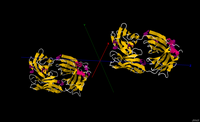
Photo from wikipedia
Aim: This pooled safety analysis was conducted to analyze incidence and management of key dacomitinib-associated adverse drug reactions (ADRs). Patients & methods: Patients with EGFR mutation-positive advanced non-small-cell lung cancer… Click to show full abstract
Aim: This pooled safety analysis was conducted to analyze incidence and management of key dacomitinib-associated adverse drug reactions (ADRs). Patients & methods: Patients with EGFR mutation-positive advanced non-small-cell lung cancer who received first-line dacomitinib at the 45 mg/day recommended starting dose were included. ADRs were identified based on reasonable association with EGFR tyrosine kinase inhibitors. Results: Overall, 251/255 patients (98%) experienced ADRs. The most common were diarrhea, rash, stomatitis, nail disorder and dry skin. Dose interruptions and dose reductions were reported in 47 and 52% of patients, respectively. Fewer grade 3 key ADRs were observed following dose reductions. Conclusion: Dacomitinib was generally tolerable. Most reported ADRs were known to be associated with EGFR tyrosine kinase inhibitors and were managed with standard medical management and dose modifications.
Journal Title: Future oncology
Year Published: 2019
Link to full text (if available)
Share on Social Media: Sign Up to like & get
recommendations!